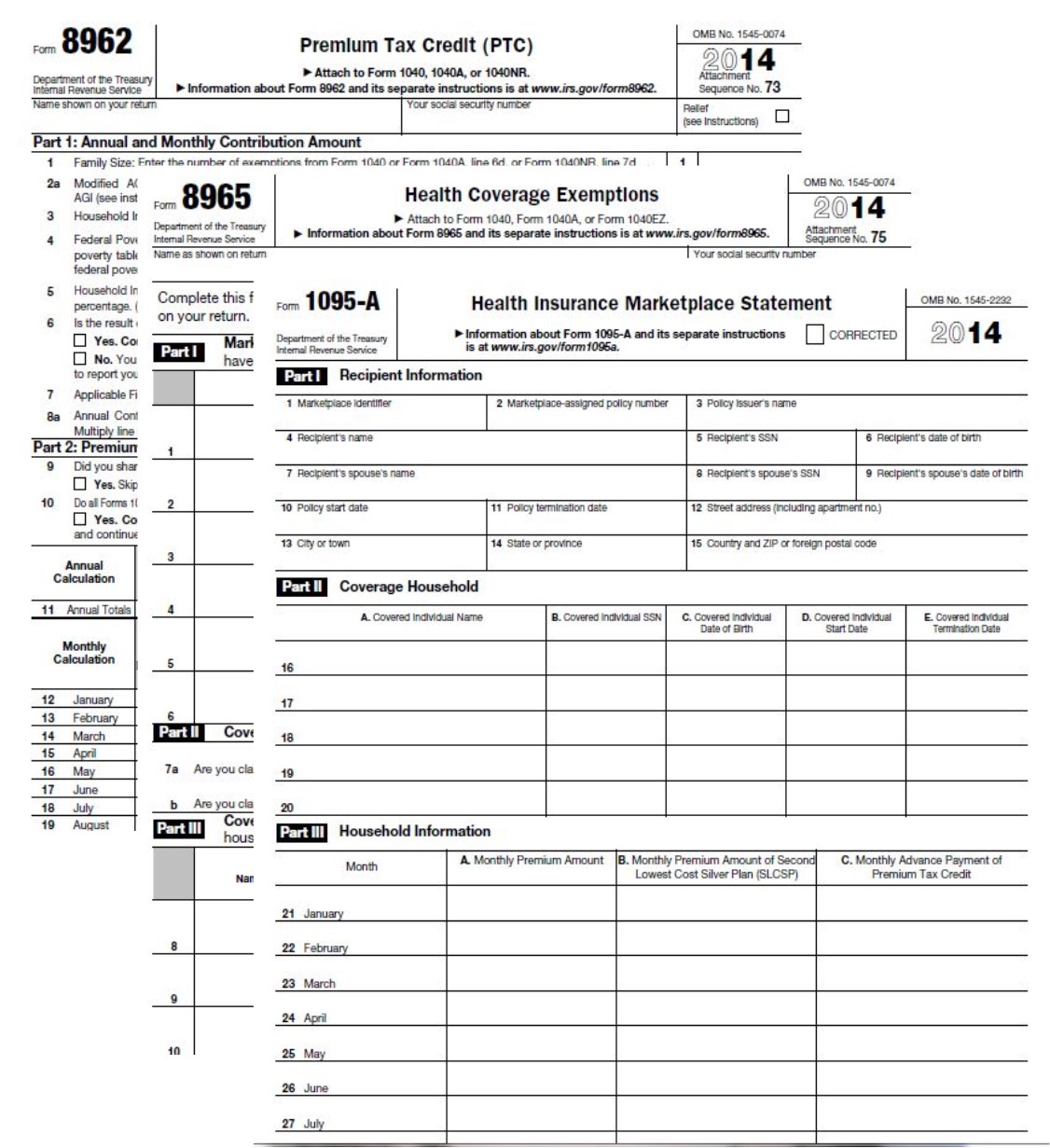 With January behind us, it’s time to start thinking about filing your 2014 income taxes.
With January behind us, it’s time to start thinking about filing your 2014 income taxes.
By now, you should have received most, if not all, of your tax forms and notices from your employer(s), banks, mortgage company, financial institutions, etc. — and, if you bought health insurance on the exchange — the Marketplace.
As we posted several weeks ago, the upcoming tax season promises to be complicated for those who received a subsidy on their health insurance, as well as those who did not have coverage for more than 3 months in 2014.
Here’s what to expect:
IRS Form 1095-A – Health Insurance Marketplace Statement
You should have received Form 1095-A from the Marketplace if you or a family member enrolled in health insurance through the health insurance marketplace in 2014.
Part I of Form 1095-A includes details about you — your name, SSN, date of birth, etc. — and your 2014 coverage — the state where you bought it, the name of the insurance company, and the dates your coverage started and ended.
Part II lists the members of your household covered on your plan. Only those people who you told the Marketplace you would claim on your tax return will be listed here.
Part III details the following, by month:
- The premium you paid
- The premium of the second lowest cost silver plan (this will be used when you file your return to help calculate whether or not you received the right amount of subsidy)
- The amount of subsidy you received (referred to by the IRS as a premium tax credit or PTC).
Line 33 of Part III includes the sum of each column, giving you the annual totals of each — this will come in handy when you’re ready to file!
You will use the data included on Form 1095-A to complete Form 8962 — Premium Tax Credit (PTC).
IRS Form 8962 – Premium Tax Credit (PTC)
If you received a 1095-A, you must complete Form 8962 and submit it with your Form 1040, 1040A or 1040NR when you file your 2014 taxes.
The IRS will use Form 8962 to reconcile whether you received too much or too little in the way of a premium subsidy for your health insurance last year.
You also must file Form 8962 if you were eligible for a PTC but did not collect the subsidy in advance, and now want to claim it.
If the form looks complicated that’s because it’s complicated!
IRS Form 8965 – Health Coverage Exemptions
The Affordable Care Act’s individual mandate requires that most Americans have health insurance by January 1, 2014.
If you did not purchase health insurance in 2014 because you are exempt from the individual mandate, you must complete IRS Form 8965.
Important: if you have a Marketplace-granted coverage exemption you must provide an Exemption Certificate Number on Form 8965. It takes some time for the Marketplace to process exemptions, so don’t delay in submitting your request! Click here for more information.
Tax Penalty
If you were uninsured for more than 3 months during 2014 and you did not have a valid exemption, you will be assessed a penalty tax when you file your 2014 tax return.
The penalty will be equal to $95 per adult plus $47.50 per child, up to a family maximum of $285 OR 1% household income, whichever is GREATER.
The penalty increases for 2015 and 2016. Click here for details.
The IRS will deduct your penalty from any refund you are due. And, your penalty amount will be added to your tax bill if you owe money.
Start Early
Because of the extra complications this year, we recommend you get started on your taxes as early as possible.
The IRS has said repeatedly it does not expect to be able to manage the high volume of calls it will receive. If you’re filing your tax return on your own, your best bet is to get it done quickly and avoid long delays on the IRS’s phone lines as we get closer to the April 15 filing deadline.
Several tax preparation firms have put together helpful information regarding the reporting requirements surrounding the Affordable Care Act. We encourage you to take advantage of those resources as well!
Please consult a tax professional for specific tax advice.





